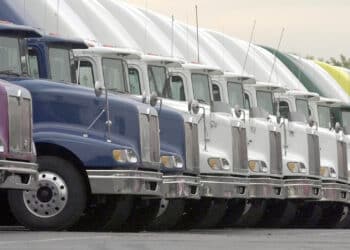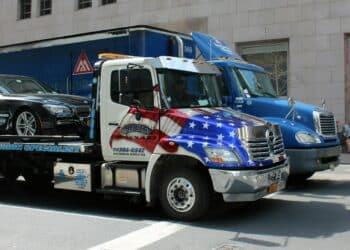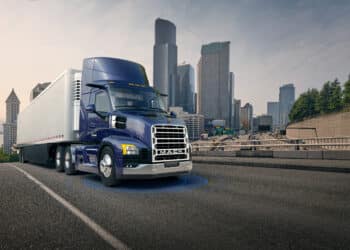A plethora of financial incentives have led to a surge in EV commercial truck sales in California, but dealers may be feeling the strain of stringent mandates as diesel truck sales decline.
New Class 8 truck sales in California fell 50% year over year in June, according to an Oct. 9 report by the Institute for Energy Research. That decrease was attributed to the California Air Resources Board’s (CARB) Advanced Clean Fleets regulation, which requires an increasing number of electric trucks to be sold.
To meet the fleets rule, zero-emission trucks must comprise 5% to 9% of sales, depending on the truck category, by the end of 2024. In 2023, the U.S. Environmental Protection Agency approved the state’s plan to require 50% of heavy-duty truck sales to be zero emission by 2035.
Such regulations are causing dealers to lose sales of diesel trucks because they’re being forced to sell EVs or other zero-emissions vehicles first, according to the report. Interest on unsold inventory can cost dealers nearly $100,000 a month.

Dealers react
The biggest flaw of the CARB mandates is that small dealerships and trucking companies aren’t taken into account, Lisa McGhee, zero-emission vehicles programs and affairs manager at the Santa Fe, Calif.-based Tom’s Truck Center, told Equipment Finance News.
“They’re excluding individuals that could be small, dealerships that could be small,” she said. While Tom’s Truck Center has two locations and sells a wide range of trucks and is a larger dealership, McGhee said other smaller dealerships “can’t survive with this level of administrative barriers and other things associated with the conversation that’s not traditional.
“It’s not a traditional sale. It takes a lot of work and a lot of time.”
Large dealerships may have the resources and expertise to adhere to EV mandates while sustaining growth, McGhee said. But the resources necessary to meet CARB’s regulations may not be available to the smaller dealers. These include an arduous review process that can withhold money for three to six months after a truck is delivered, she said.
Class 8 sales suffer despite incentives
Class 8 truck sales have dropped despite a surge in zero-emission sales. Zero-emission heavy-duty truck sales in California rose 234% YoY in 2023 to 354, according to a CARB report released in May.
Meanwhile, state and federal agencies are offering incentives to bolster EV initiatives, including:
- CARB’s Truck and Bus Voucher Incentive Project, which provides up to $120,000 for heavy-duty electric trucks and up to $375,000 for electric school buses; and
- The federal Commercial Clean Vehicle Credit, which provides up to $40,000 for EV trucks weighing more than 14,000 pounds.
For many fleet owners, purchasing an EV truck would not be possible without such grants given that they cost at least twice as much as diesel trucks, McGhee said.
Trucking industry fights back
The Specialty Equipment Market Association (SEMA) and the National Truck Equipment Association (NTEA) filed a lawsuit against CARB on Oct. 8 in the U.S. District Court’s Eastern District of California. The plaintiffs are seeking an immediate injunction to stop CARB’s EV mandates, according to a release by SEMA.
The trade groups claim that CARB has exceeded constitutional and state authority and that its regulations will have an adverse effect on an industry that had already been making strides toward more sustainable practices, the release states.
“The overreach of California has forced the hand of the automotive industry, making this legal action necessary to protect the interests of the thousands of automotive aftermarket companies whose $337 billion annual economic impact helps drive our nation’s economy,” SEMA President and Chief Executive Mike Spagnola stated in the release.
Left unchecked, CARB’s mandates will deliver a significant blow to dealers by hindering sales of diesel trucks that are more practical and affordable for many fleet owners, NTEA President and CEO Steve Carey stated.
More states hop on board
The following 17 states have adopted regulations similar to CARB’s: Colorado, Connecticut, Delaware, Maine, Maryland, Minnesota, Nevada, New Jersey, New Mexico, New York, Oregon, Pennsylvania, Rhode Island, Vermont, Virgina and Washinton. Ten states have adopted rules specific to heavy-duty trucks.
Colorado is one of those states, requiring manufacturers to reduce nitrogen oxide emissions from new heavy-duty trucks by 90% starting with model year 2027, according to the Colorado Department of Public Health and Environment.
Infrastructure woes
However, inadequate EV infrastructure and technological differences are posing challenges to truck dealers in Colorado, Bodee Avery, general manager of Commerce City, Colo.-based Bruckner’s Truck and Equipment, told EFN.
“They’re demanding percentages of trucks be no-emission or electric, but the infrastructure to handle that is not there,” he said. “Plus, electric is not for everybody. The technology is not developed enough to work for everybody. … So, there’s going to be challenges both on the dealer side and the customer side trying to adhere to the mandates.”
Pennsylvania has adopted CARB mandates for light-duty vehicles and has an Advanced Clean Trucks rule that will require 40% to 75% of truck sales to be zero emission by 2035, according to consultant Environmental Resources Management.
But CARB and similar regulations place an unnecessary burden on truck dealers, Chris Grivas, president of Chadds Ford, Pa.-based CAG Truck Capital, told EFN.
“You should have the freedom to go into a dealership and buy the truck you want, not force the dealership to make up your mind for you.”
While EV mandates may negatively impact dealers, their impact on lenders will be marginal because they will still be able to finance used trucks to companies in other states with less stringent regulations, Grivas said.
Register here for the free webinar “Used equipment financing in 2025 as markets normalize,” taking place on Tuesday, Oct. 22, at 11 a.m. ET.









